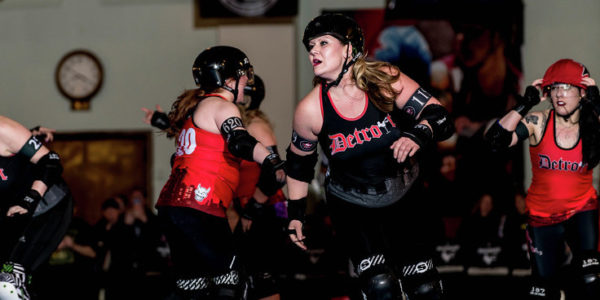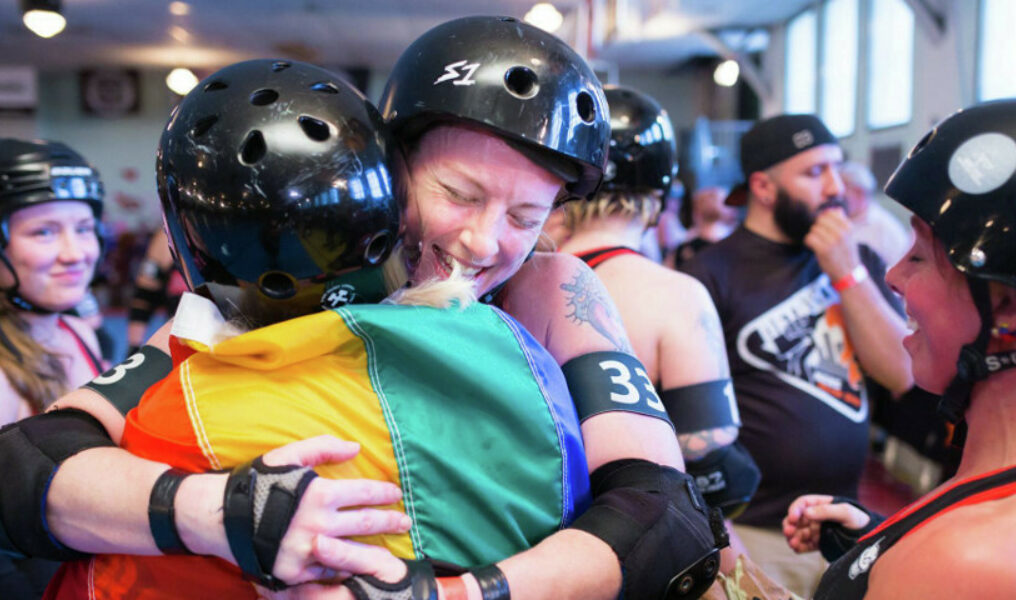Starting in January 2005, a group of Metro Detroit women, ranging from mothers to students to careerists, craved an escape from their day-to-day lives and sought to discover their competitive and edgier sides. It was among the city's roller derby rinks that they were able to familiarize each other with those aspects of themselves. Soon after joining together, they founded the Detroit Derby Girls league and held their first event in February 2006. In November of that year, the league announced it had officially changed its name to Detroit Roller Derby. Eventually, it became a group that stands out as a premier team.
Melissa McDonald is a member of the league. She said the group's success is a "reflection of the city" within which it was born.
"We hustle. We've got grit and tenacity (and) our members work hard on and off the track. Most of our members work full-time jobs, many are parents, and, on top of all of that, they're coming to practice two to three times a week, working a league job and contributing to the community," McDonald said. "I'm biased, but I would also say we have the best fans, and the best venue. It feels amazing to play at the Masonic temple, in the heart of the city, to a crowd who is just as invested in the teams, their rivalries, their struggles and successes."
Perhaps one of the reasons behind the team's success and the drive of its members is Detroit Roller Derby's overall attention to inclusivity. Adam Kenyon is a member of DRD whose team name is AK40oz. He said that roller derby has always had "strong representation from queer skaters and staff from the beginning."
"Though I'd never want to speak for everyone, I can say it has largely been very socially liberal as a subculture and movement," Kenyon said. "There are plenty of people across the sport who are not only on the vanguard of social movements, there are even folks in politics who are, or were, very involved in roller derby. There has always been a strong push within Detroit Derby to be at the forefront of conversations about diversity and gender equality, even across the community at large."
And DRD doesn't seem to be unique in this push for versatility and progressive change. Throughout its history, those qualities seem to have been a hallmark of the sport itself. In fact, during its modern revival, roller derby has come to be one of the most inclusive sports there is today. Since its inception in the early 20th century, the sport has constantly changed its image — from a roller-skating competition to a stunt-oriented, stylized version — eventually, becoming an athletics-heavy sport that has shot up in popularity both locally and around the country.

Photos by Lex Dodson used with permission from Detroit Roller Deby.
One of the reasons is because there is no mold for a "classic" roller derby participant. Amanda Draft, whose team name is Meryl Slaughterburgh, is also a member of Detroit Roller Derby. She talked about how that lack of distinct player definitions has created a huge pull for skaters to join leagues everywhere. Draft said that roller derby can attract anyone from lifelong athletes who are looking to stay fit after high school and college, to first-time sportspeople.
"Roller derby attracts a wide variety of age groups. In Detroit alone, we have adult skaters ranging in age from 18 to mid-40s. Derby is played by 'real' people with day jobs," Draft said. "Petite or robust, a skater can see their body type represented on the track doing amazing things. It is 'for the skater, by the skater' and is not owned by an outside entity — we have ownership over our sport."
Still, as inclusive as the sport is now, that didn't come easily for all groups involved. And, in fact, there have been some stumbling blocks along the road.
"The inclusion and acceptance for trans skaters has been a much tougher conversation through the years in the sport and league, and even still is in roller derby at large," Kenyon said. "Though the official stance of the leagues (Detroit and internationally) moves toward inclusion there are still people in the sport that have different perspectives. For a long time, there was the general feeling amongst a lot of us that derby was a place for any number of folks who didn't feel totally comfortable in 'square' society."
Draft talked about the arc of inclusion inside the league and the sport as a whole through policies enacted by the Women's Flat Track Derby Association, or the sport's international governing body. She said it has "evolved over time" in terms of acceptance.
"The WFTDA implemented a gender policy in 2011 that required hormonal documentation for trans and intersex women," Draft said. "They revised that policy in 2015 to remove the hormonal requirement, stating that trans women, intersex women and gender-expansive individuals can play if they feel that women's roller derby is the place for them. As an organization, we have followed that change, but we acknowledge that we still have work to do in this area."
But even with what remains to be done, DRD is visibly working to include anyone interested in playing and retaining its members.
"Detroit is also the biggest league in Michigan. We have four home teams, three travel teams, a men's team, two juniors' home teams and two juniors' travel teams," McDonald said. "There's a place for you here no matter who you are or what you want to do."

Photos by Lex Dodson used with permission from Detroit Roller Deby.
Detroit Roller Derby's next boot camp for new skaters will start the second week of January. Those who are interested in joining can email [email protected] to get more details, or by visiting detroitrollerderby.com, following the group on facebook.com/DetroitRollerDerby/ or by finding them on Instagram @detroitderby.










